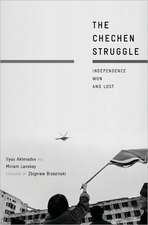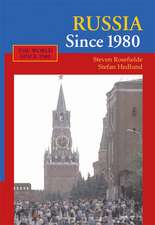Development and Diffusionism: Looking Beyond Neopatrimonialism in Nigeria, 1962–1985
Autor J. Dibuaen Limba Engleză Hardback – 28 dec 2012
| Toate formatele și edițiile | Preț | Express |
|---|---|---|
| Paperback (1) | 386.22 lei 6-8 săpt. | |
| Palgrave Macmillan US – 10 dec 2015 | 386.22 lei 6-8 săpt. | |
| Hardback (1) | 394.51 lei 6-8 săpt. | |
| Palgrave Macmillan US – 28 dec 2012 | 394.51 lei 6-8 săpt. |
Preț: 394.51 lei
Nou
Puncte Express: 592
Preț estimativ în valută:
75.49€ • 78.82$ • 62.34£
75.49€ • 78.82$ • 62.34£
Carte tipărită la comandă
Livrare economică 15-29 aprilie
Preluare comenzi: 021 569.72.76
Specificații
ISBN-13: 9781137286642
ISBN-10: 1137286644
Pagini: 255
Ilustrații: XVIII, 255 p.
Dimensiuni: 152 x 229 x 20 mm
Greutate: 0.57 kg
Ediția:2013
Editura: Palgrave Macmillan US
Colecția Palgrave Macmillan
Locul publicării:New York, United States
ISBN-10: 1137286644
Pagini: 255
Ilustrații: XVIII, 255 p.
Dimensiuni: 152 x 229 x 20 mm
Greutate: 0.57 kg
Ediția:2013
Editura: Palgrave Macmillan US
Colecția Palgrave Macmillan
Locul publicării:New York, United States
Cuprins
1. Neopatrimonialism, Eurocentric Diffusionism, and Development Planning 2. Theoretical and Conceptual Foundations of Development Planning 3. Colonial Planning and the Foundations of Eurocentric Diffusionism 4. Postcolonial Planning and the Dialectics of Neopatrimonialism 5. Planning Agricultural Development in Bendel State 6. Planning Industrial Development in Bendel State
Recenzii
'I find this book to be cogent in its arguments and criticisms, and apt and rigorous in its theoretical analysis. It represents par excellence a good blend and balance of theoretical and empirical analyses and it is a paradigm of how theoretical and empirical analyses can mutually support and inform each other to produce a good scholarly work. As a philosopher whose interest is primarily in theoretical work, I find this book to be invaluable to people, especially African philosophers, who are interested in the theories and philosophy of development, and the idea of using philosophical theories to inform the practical issues of development in Africa.' - Polycarp Ikuenobe, Professor of Philosophy, Kent State University, USA
'Revisionist in its approach and erudition, the book shifts the locus of inquiry into Africa's development challenges from neopatrimonialism to Euro-American hegemony and globalism within the context of neo-colonialism and the Cold War. It is a significant contribution to the discourses on development policies and implementation strategies, their attendant hiccups, and the role of the state and external forces in the process.' - Apollos Okwuchi Nwauwa, Professor of History & Director, Africana Studies Program, Bowling Green State University, USA
'Jeremiah I. Dibua's Development and Diffusionism eloquently adopts a historical perspective and case study approach, in exploring the influence of Eurocentric diffusionism on development policies in Nigeria. Using elaborate theoretical and empirical evidence, he effectively challenges the received wisdom that the Weberian-influenced neopatrimonial paradigm tries to foster through their attribution of the failures of development policies in Nigeria to only internal factors.' - Onaiwu W. Ogbomo, Professor of Africana Studies & History, Western Michigan University, USA
'Revisionist in its approach and erudition, the book shifts the locus of inquiry into Africa's development challenges from neopatrimonialism to Euro-American hegemony and globalism within the context of neo-colonialism and the Cold War. It is a significant contribution to the discourses on development policies and implementation strategies, their attendant hiccups, and the role of the state and external forces in the process.' - Apollos Okwuchi Nwauwa, Professor of History & Director, Africana Studies Program, Bowling Green State University, USA
'Jeremiah I. Dibua's Development and Diffusionism eloquently adopts a historical perspective and case study approach, in exploring the influence of Eurocentric diffusionism on development policies in Nigeria. Using elaborate theoretical and empirical evidence, he effectively challenges the received wisdom that the Weberian-influenced neopatrimonial paradigm tries to foster through their attribution of the failures of development policies in Nigeria to only internal factors.' - Onaiwu W. Ogbomo, Professor of Africana Studies & History, Western Michigan University, USA
Notă biografică
Jeremiah I. Dibua is a Professor of History and coordinator, Graduate Programs in History and African American Studies at Morgan State University, Baltimore, USA. He has published extensively on modern African history, politics and economy, and on the political economy of development. He is the author of Modernization and the Crisis of Development in Africa: The Nigerian Experience (2006).














